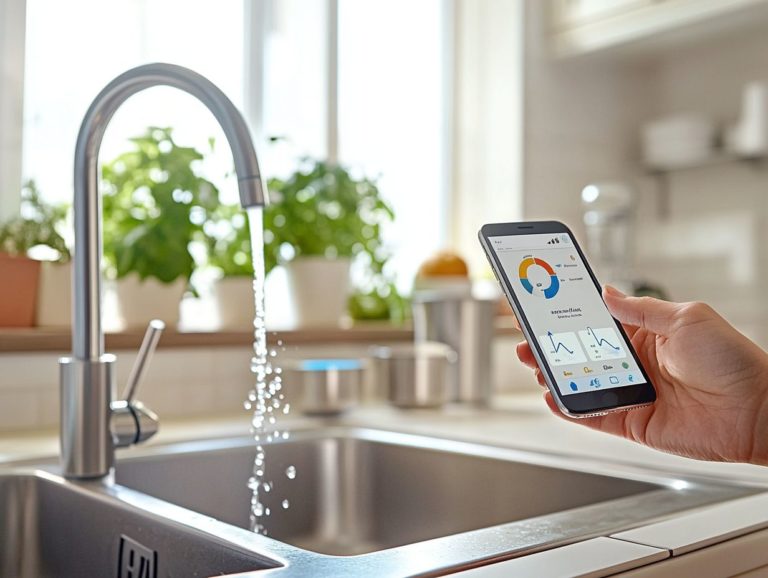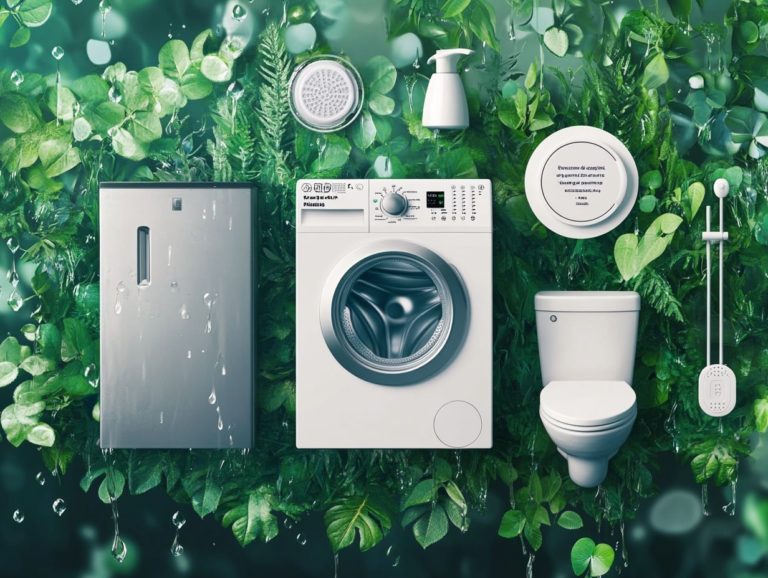The Benefits of Smart Water Management Systems
In an age where water scarcity is a pressing concern, the emergence of Smart Water Management Systems is revolutionizing how we utilize and conserve this essential resource.
These innovative technologies boost efficiency and lower costs while fostering sustainability across various environments, from agricultural fields to urban infrastructures.
This article delves into the benefits of adopting smart systems, the types available, key factors to consider when selecting the right one, and best practices for effective maintenance.
You re invited to explore how smart water management can pave the way for a greener, more sustainable future.
Contents
- Key Takeaways:
- Benefits of Implementing Smart Water Management Systems
- Types of Smart Water Management Systems
- How to Choose the Right Smart Water Management System for Your Needs
- Implementing and Maintaining Smart Water Management Systems
- Frequently Asked Questions
- What are smart water management systems?
- What are the benefits of using smart water management systems?
- How do smart water management systems work?
- What are the components of a smart water management system?
- What types of industries can benefit from smart water management systems?
- Can smart water management systems be customized for different needs?
Key Takeaways:

Discover how smart water management systems can save you water and money! From irrigation to leak detection, each type has unique benefits. Choose wisely and follow best practices to maximize your results.
What are Smart Water Management Systems?
Smart Water Management Systems harness advanced technologies like IoT (Internet of Things), smart sensors, and data analytics to improve efficiency, sustainability, and the quality of your water management efforts.
By adopting these systems, you can achieve real-time monitoring of water quality, optimize your water supply, and ensure regulatory compliance all while effectively managing resources amid challenges such as water scarcity and environmental degradation.
These systems comprise various components, including smart meters, automated valves, and centralized control platforms that work together to facilitate seamless operation.
Their importance in urban infrastructure is remarkable; they enable predictive maintenance to catch potential failures before they escalate and bolster conservation efforts by pinpointing leaks and inefficiencies.
The applications are vast and extend across multiple sectors. In agriculture, for example, they allow for precision irrigation, while industries that are water-intensive can ensure sustainable use and reduce operational costs.
By leveraging these technologies, you can significantly mitigate the impacts of climate change while securing a reliable water supply for future generations.
Benefits of Implementing Smart Water Management Systems
Implementing Smart Water Management Systems offers a wealth of benefits, including enhanced efficiency, significant cost savings, and improved water productivity, as highlighted in the benefits of water-saving technologies in homes.
These systems are game-changers for modern urban development and agricultural operations alike.
They excel in leak detection, minimizing maintenance costs, optimizing water distribution, and ensuring the conservation of vital water resources.
In doing so, they play a critical role in advancing overall sustainability initiatives.
Efficiency and Cost Savings
The implementation of smart water management systems significantly enhances efficiency and leads to substantial cost savings, thanks to smart meters and automated processes.
By leveraging IoT technology and data analytics for equipment monitoring, you can optimize resource allocations while minimizing maintenance costs.
These advanced technologies deliver real-time data, allowing for quick adjustments in water distribution that are especially beneficial for water-intensive sectors like agriculture and manufacturing.
For instance, if you employ smart meters, you can identify leaks much faster, helping reduce water waste and lower your operational expenses.
Automation also enables proactive maintenance schedules, preventing costly repairs and ensuring a more reliable water supply.
Integrating these innovations not only conserves vital resources but also helps your urban infrastructure become more resilient and responsive to fluctuations in demand and climate impacts.
Start exploring smart water solutions today to safeguard our planet’s future!
Conservation and Sustainability
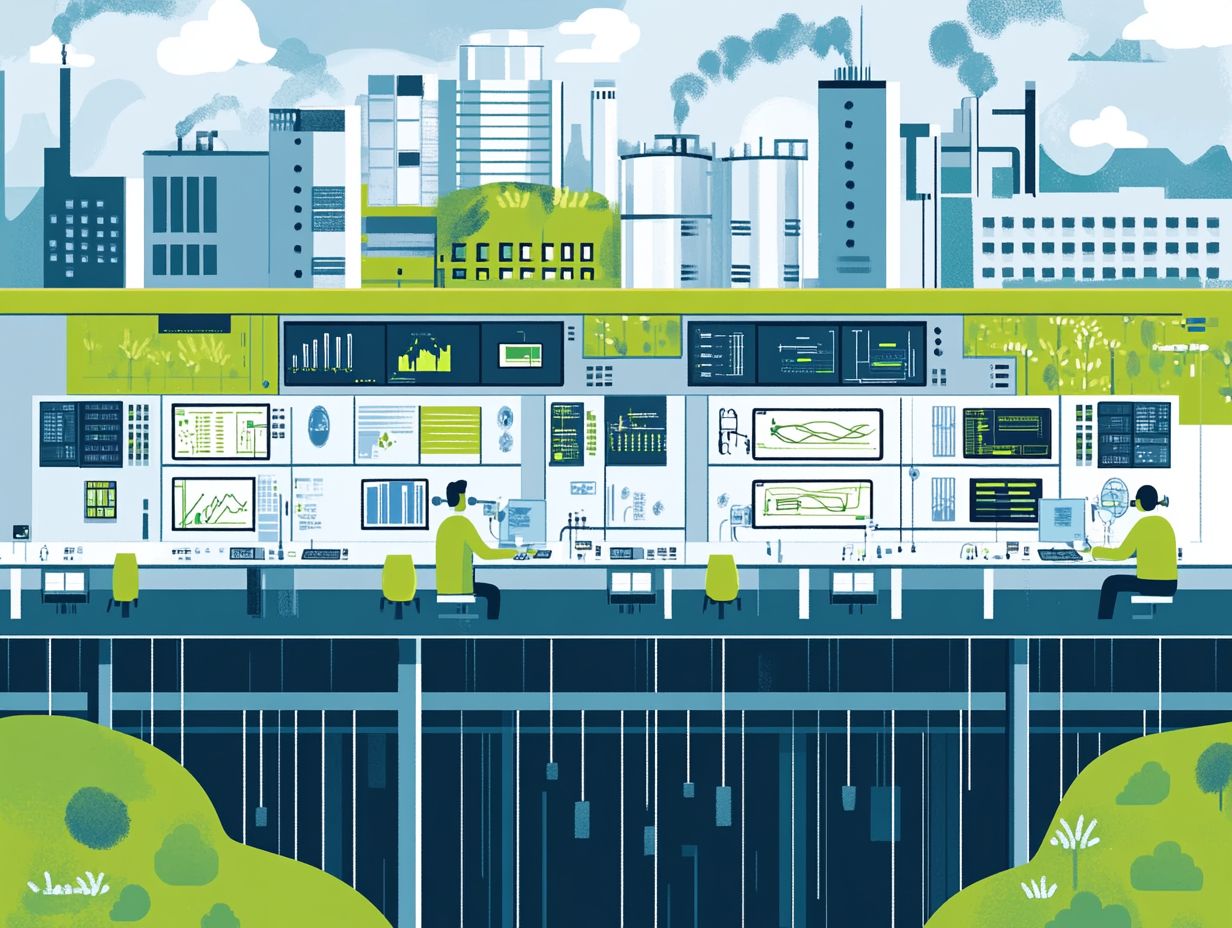
Conservation and sustainability are crucial for effective water management systems. These principles drive initiatives to minimize water waste and enhance resource management.
Smart irrigation technologies and real-time monitoring make significant strides in environmental conservation. They help reduce pollution in both agricultural and urban areas.
These advancements optimize water usage and ensure crops get the right amount of moisture for healthy growth. They mitigate over-irrigation risks and promote soil health.
For example, drip irrigation systems and soil moisture sensors help fine-tune watering schedules. This targeted approach boosts yields and reduces energy consumption.
Cities that implement smart water meters gain valuable insights into usage patterns. This empowers residents to understand their consumption and fosters a culture of responsibility around water resources.
Collectively, these initiatives are pivotal for sustainable agriculture and long-term environmental resilience.
Types of Smart Water Management Systems
Smart Water Management Systems can be classified into distinct categories. This includes smart irrigation systems for agriculture and leak detection systems for urban infrastructure.
These smart systems use advanced technology and sensors to improve water quality management and ensure efficient wastewater disposal.
Irrigation Systems
Smart irrigation systems use technology and sensors to optimize water usage in agriculture. They enhance productivity and align with sustainability principles.
By monitoring consumption in real-time, you can make informed decisions to maximize resource efficiency. These systems provide insights into soil moisture, weather, and crop water needs, reducing waste.
Expect improved crop yields and cost savings. Automating irrigation schedules means less manual labor and more precise water application, minimizing runoff.
Smart irrigation systems empower you to embrace sustainable practices. They foster resilience against climate change while benefiting both producers and the environment.
Leak Detection Systems
Leak detection systems are essential in smart water management. They use sensors and real-time monitoring to identify and address leaks effectively.
By ensuring pipeline integrity, these systems enhance the efficiency of water distribution networks. They employ methods like acoustic sensors and flow monitoring to detect leaks.
Real-time data helps you make timely decisions to minimize water loss and reduce energy consumption. Early detection ensures compliance with environmental standards, safeguarding public health.
With urban areas growing and water resources becoming scarce, integrating leak detection systems is essential for effective management.
How to Choose the Right Smart Water Management System for Your Needs
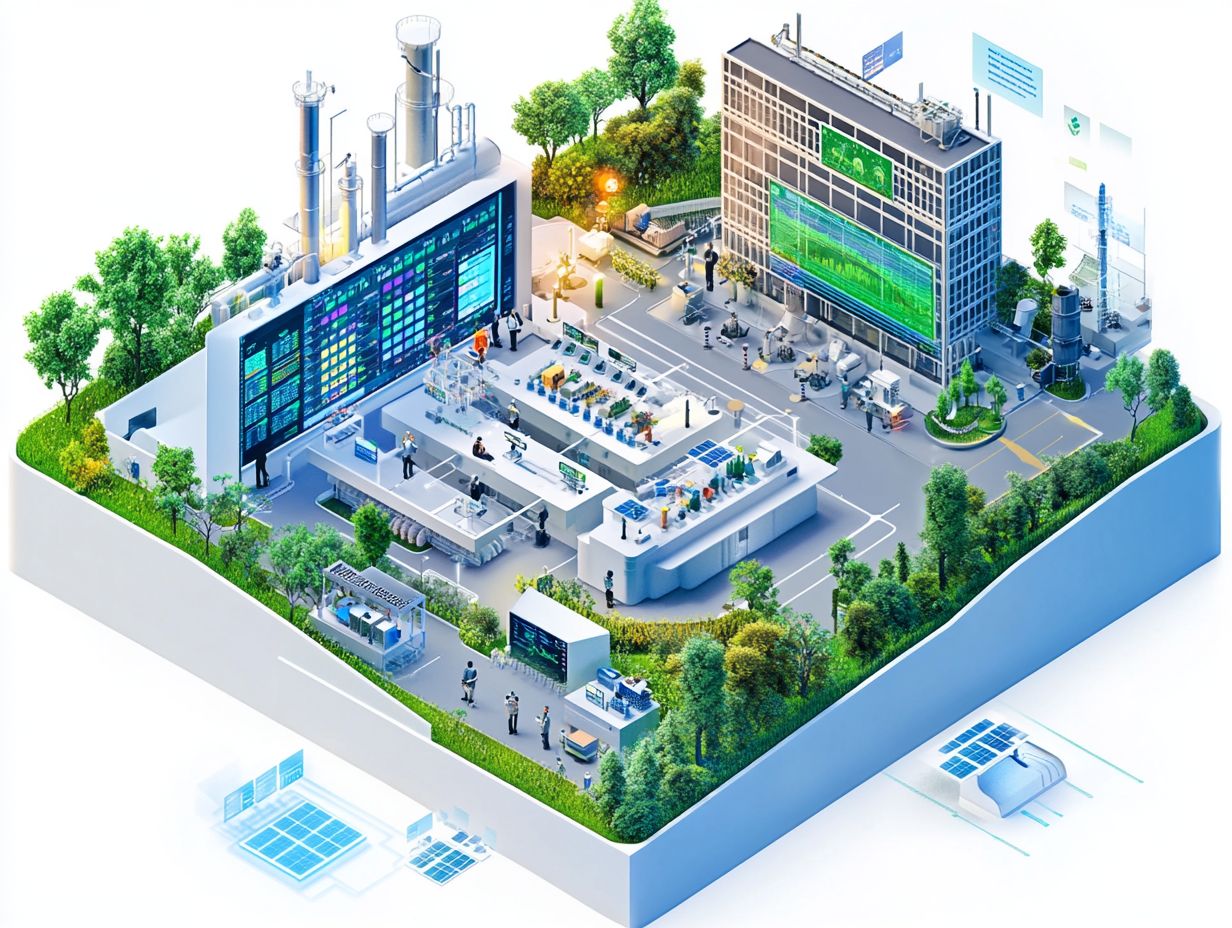
Choosing the right Smart Water Management System requires careful attention. Key factors include efficiency, regulatory compliance, and seamless integration with your needs.
By making thoughtful decisions, you can ensure the system aligns with your objectives and effectively addresses current and future water management challenges.
Factors to Consider
When you re evaluating smart water management systems, several key factors need consideration, such as budget constraints, scalability, technology compatibility, and ongoing maintenance requirements. These elements are crucial in the decision-making process and ensure that you select a system that effectively manages water resources.
A thorough assessment of your budget is essential as it directly influences the feasibility of your project and guides your choice of systems and technologies.
You should also prioritize scalability; the system you choose should easily adapt to future growth and increased demand, sparing you from costly upgrades later on.
Ensuring technology compatibility is another important step. This allows for seamless integration with your existing infrastructure, enhancing operational efficiency while minimizing disruption.
Together, these considerations affect your initial investment and play a significant role in the long-term success and sustainability of your entire water management initiative.
Implementing and Maintaining Smart Water Management Systems
Successfully implementing and maintaining smart water management systems requires your commitment to best practices, effective maintenance processes, and continuous training for your personnel. Commit to best practices and watch your system s performance soar!
This approach guarantees optimal performance through diligent equipment monitoring and insightful data analytics, empowering your organization to fully leverage the advantages of smart technologies in water management.
Best Practices and Tips
Adopting best practices is essential for the successful implementation of smart water management systems. This ensures efficiency improvements and optimal performance.
By emphasizing a data-driven approach, ongoing training, and regular maintenance, you can fully realize the benefits of your smart water solutions.
Integrating advanced analytics provides real-time insights, enabling proactive decision-making that addresses potential issues before they escalate. Internet of Things (IoT) sensors, which collect data automatically, enhance your data collection, improving both water usage accuracy and leak detection.
Regularly scheduled training workshops are vital for keeping your staff updated on the latest technologies and procedures, ultimately boosting overall system competency. Routine audits and upgrades of hardware and software are crucial for maintaining system integrity.
By embracing these practices, you enhance your operational performance and contribute to sustainable water conservation efforts.
Frequently Asked Questions
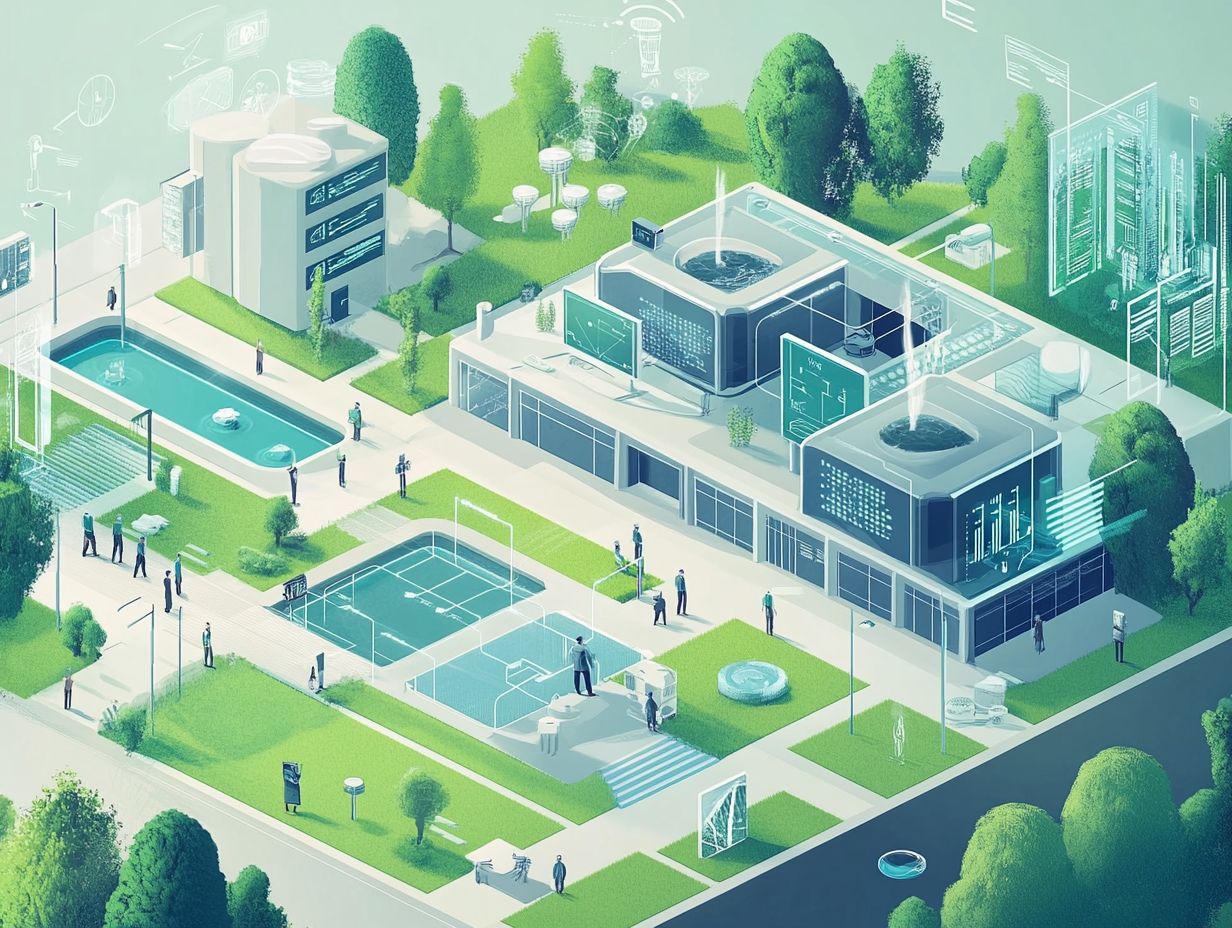
What are smart water management systems?
Smart water management systems are advanced technologies that use data and analytics to monitor, control, and optimize water usage in a more efficient and sustainable way. These systems can be integrated with different water infrastructure, such as pipes, pumps, and valves, to provide real-time information and automated actions for better water management.
What are the benefits of using smart water management systems?
The benefits of smart water management systems include:
- Conserving water resources: By accurately tracking water usage and detecting leaks, these systems help reduce water waste and conserve precious water resources.
- Cost savings: By optimizing water usage, smart water management systems can help reduce water bills and operational costs for businesses and municipalities.
- Improved efficiency: These systems automatically adjust water flow and pressure according to demand, resulting in more efficient water usage and distribution.
- Real-time monitoring: With real-time data, these systems quickly identify and address any water quality or leakage issues, preventing potential damage and costly repairs.
- Sustainability: By promoting smarter and more sustainable water usage, these systems contribute to a greener and more eco-friendly environment.
- Data-driven decisions: The data collected by smart water management systems informs decision-making for future water management strategies and planning.
By implementing these smart water management systems, you can significantly improve efficiency and contribute to sustainable practices. Learn more about how these systems can transform your water management efforts!
How do smart water management systems work?
Smart water management systems use sensors and meters. These devices collect data on water usage, flow, pressure, and quality.
This data is processed by the system’s software. It can trigger automated actions like adjusting water flow or sending alerts for potential issues.
What are the components of a smart water management system?
The components of these systems may vary, but some common ones include:
- Sensors and meters: Devices that collect data on water usage, flow, pressure, and quality.
- Data communication network: A system that helps data move from sensors to software.
- Software and analytics: This processes data to provide insights and trigger automated actions.
- Control devices: Valves and pumps that can be remotely controlled to adjust water flow and pressure.
- User interface: This allows users to monitor and manage the system, access data, and make adjustments.
What types of industries can benefit from smart water management systems?
Smart water management systems are a game-changer for many industries! They can revolutionize how we manage water.
- Public utilities and municipalities
- Commercial buildings and facilities
- Agriculture and irrigation systems
- Industrial plants and factories
- Hospitality and leisure facilities
- Residential communities and homeowners
Can smart water management systems be customized for different needs?
Yes, these systems can be customized to meet the specific needs of different industries. Adjustments can include sensor types, automation levels, and analytics capabilities.


